If you're starting in SEO or are a business owner looking to improve the performance of their website and make it easier to find on the search engines, there's an excellent chance that you have many questions.
It's often hard to know where to turn to find answers to even the most basic of queries that you have, especially given that it's often the case that you'll discover contradicting answers on the web.
A lot of this comes down to the fact that Google's algorithms change so frequently (somewhere in the region of 500 to 600 times each year), and while not all of these are significant updates, the bottom line is that things change. The tactics that worked and best-practices that were true a few years ago might not be the same today. However, some things remain pretty static in SEO that you maybe need explaining in layman's terms.
To help you out, we've answered 23 of the most commonly asked questions about the SEO basics, specifically looking at:
General SEO Questions 1. What is SEO? 2. Does My Business Need SEO? 3. How Does SEO Work? 4. How Can I Find The Keywords That People Are Searching For To Find Businesses Like Mine? 5. Why Isn't My Website Ranking on Google? 6. Why Has My Organic Traffic Dropped? 7. What Is A Google Penalty? 8. How Long Does It Take To Rank on Google? 9. What Are Google's Most Important Ranking Factors? 10. Should I Do SEO, Run PPC Ads, or Both? 11. Does Social Media Help To Increase My Website's Rank? Technical SEO Questions 12. What Is The Difference Between On-Page SEO and Technical SEO? 13. What PageSpeed Score Should I Aim For? 14. How Can I Find Technical SEO Errors? Content Marketing Questions 15. How Long Should a Page of Content Be? 16. How Do I Create SEO-Friendly Content? 17. Does Duplicate Content Harm Your Website's Rankings? Link Building Questions 18. What Is Link Building? 19. How Do I Get Other Sites To Link To Mine? 20. Should I Focus On Getting More Links? 21. Is It True That I Can Buy Links? 22. What Is PageRank? 23. How Do I Analyze My Competitor's Link Profile?General SEO Questions
There is so much information to know about SEO - a wide range of topics, from broad questions to more in-depth, specific tactics. In this breakdown, we've rounded some of those that are commonly asked below.
1. What is SEO?
Search Engine Optimization is the practice of ranking a website on the search engines to increase its visibility when users search for relevant keywords and queries.
As you can increase the ranking of a site across a range of keywords, you will begin to see an increase in the organic traffic that it receives. Organic traffic is that which comes from Google's natural listings, rather than paid ads. Our " What is SEO?" guide further answers this question, breaking down the things that you need to do to get your website to show up on the SERPs (search engine results pages):
Ensure these search engines understand who you are and what you offer. Convince them that you are the most credible option for their users. Make your content deliverable.But it's important to understand that Google ranks results based on the best-fit for the query being searched.
You can learn more about what SEO is in our SEO 101 video by Jason Barnard below:
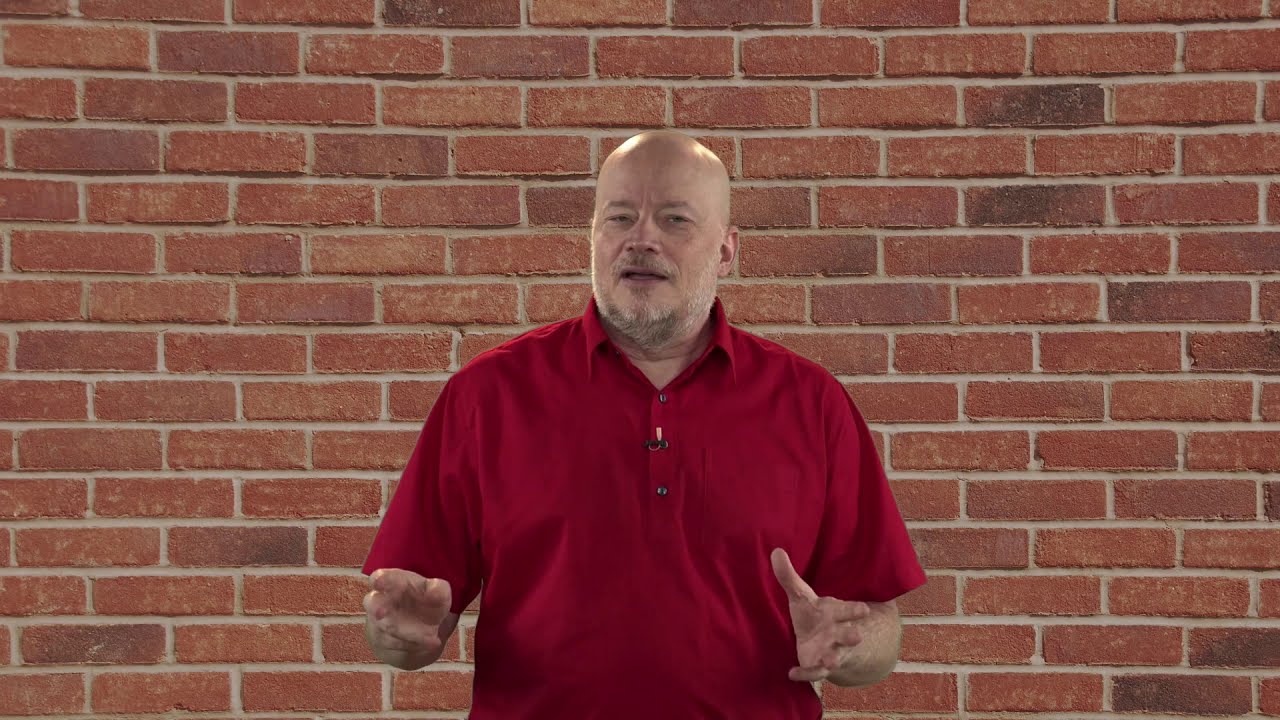
2. Does My Business Need SEO?
Yes, your business should be investing in SEO. Search engine optimization offers a way to increase traffic without paying for each and every click.When you run PPC ads, you'll be charged for every single click that comes to your website through that channel. However, if your website ranks organically on the search engines, this traffic is essentially free (at least in terms of a cost-per-click). Of course, it takes investment into skills and resources to rank a website on the SERPs.
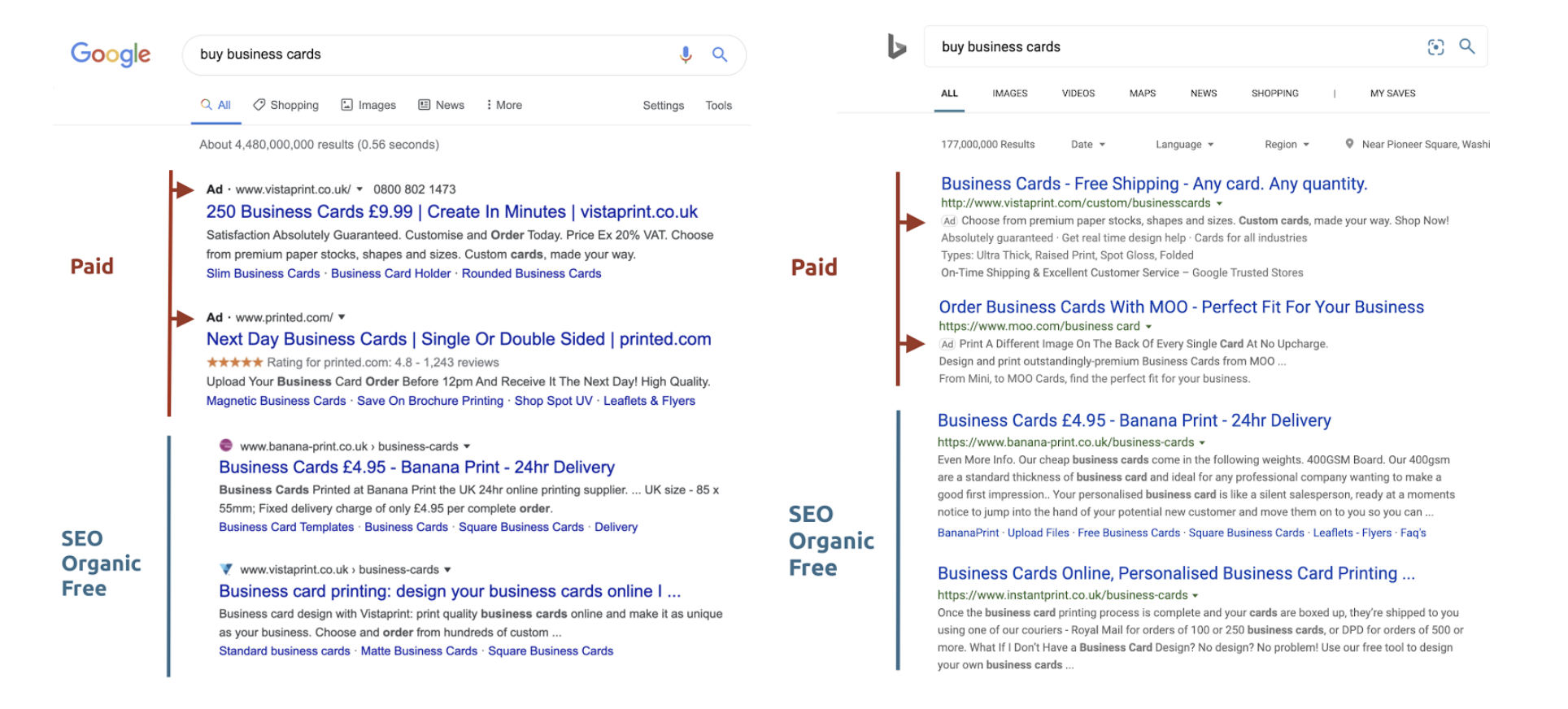
If you're able to rank your website at the top of the search engines, you'll benefit from a stream of traffic that won't have click costs associated with it, and that won't stop when ads are turned off. Rank organically, and you'll enjoy 24/7 visibility.
But let's also remember that organic search is responsible for an average of 53% of total site traffic. If you're ignoring SEO, your competitors are enjoying this traffic. Most businesses cannot ignore the importance of SEO. No matter what type of company you are, whether you're a local business, sell online, or are a global enterprise, you need to be paying attention to your SEO strategy.
3. How Does SEO Work?
SEO is the process of optimizing your website to rank higher on the search engines. But how does SEO work?
Google uses over 200 ranking factors, and these allow the search engine's algorithms to rank websites based upon the relevancy and authority of their pages. As Jason Barnard comments:
Google is striving to recommend the most relevant answer from the most trustworthy source in the most appropriate format for its user.
To succeed at SEO, you need to ensure that your content is the most relevant result for a specific search query and that your website is seen as a trustworthy source. You can read our guide on SEO basics to learn more about how to optimize your site if you're a beginner.
4. How Can I Find The Keywords That People Are Searching For To Find Businesses Like Mine?
You can't jump into an SEO strategy blind. You need to know what people are searching for on Google to find businesses just like yours to optimize your site for these terms.
You can do this either using Google's Keyword Planner or the SEMrush Keyword Magic Tool. Load up the tool and enter a term that you think people would use to find your business online. You'll then be served a whole host of related keyword suggestions, including their monthly search volume.
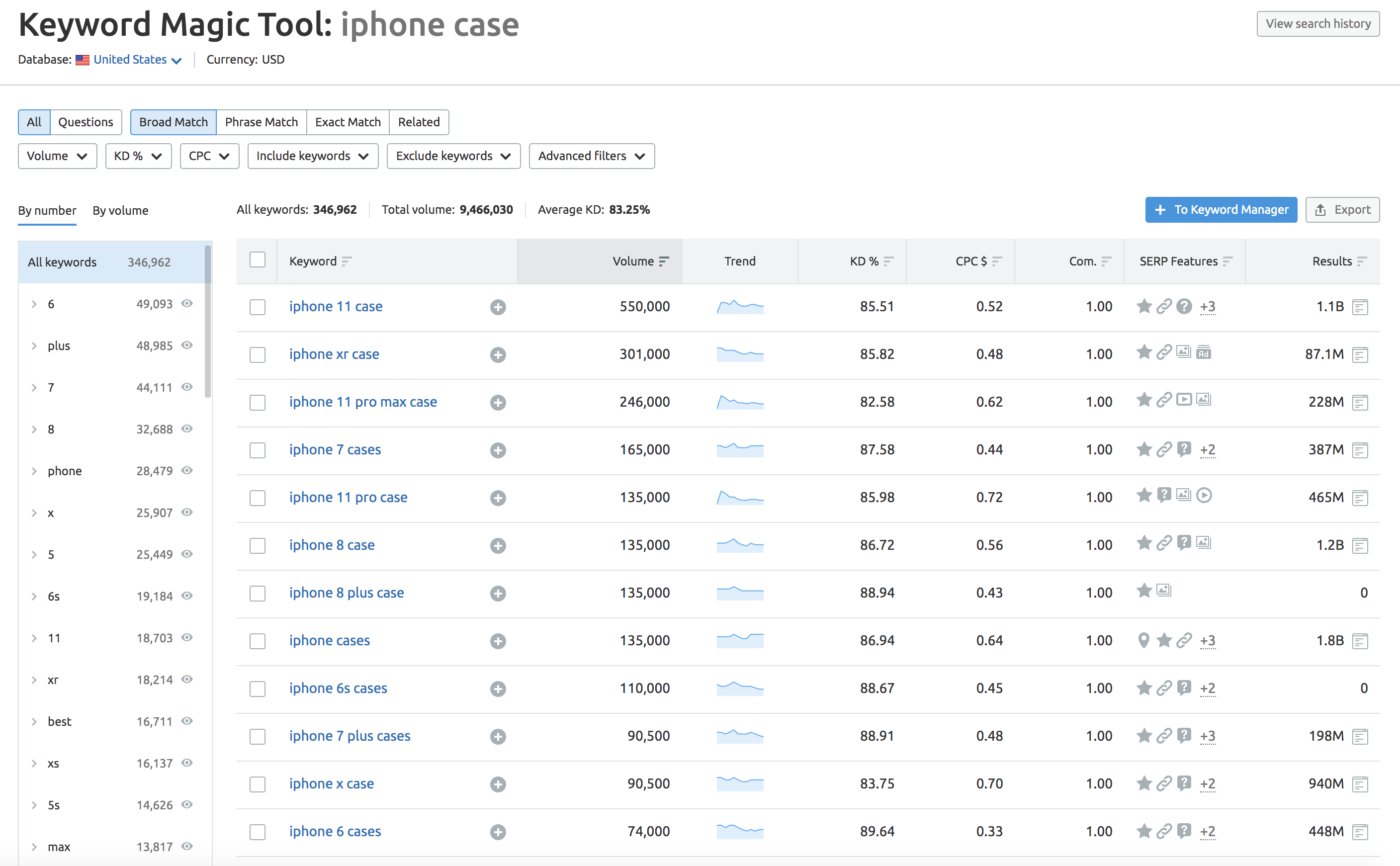
You can then use these insights to inform your strategy and understand what people are searching for.
5. Why Isn't My Website Ranking on Google?
If your website isn’t ranking on Google, there are a few reasons why that could be. But first, head to Google and run a site: search for your website.
e.g., “site:semrush.com”

If you see your site’s web pages listed, you know that your site is indexed. Reasons why your website isn’t ranking could be that:
Your site is new and hasn’t built up sufficient authority to rank for competitive search queries. You can’t launch a website and expect to rank for your target queries overnight; you need to demonstrate that you deserve to rank.
Your content doesn’t match the searcher's intent or lacks in-depth analysis or quality compared to the pages that rank for the queries you’re looking at. You need to ensure that the pages you serve are at least as good as, ideally better than, what’s already ranking.
If you don’t see any of your website’s pages listed, this means that it has not been indexed. Reasons for this could include:
Your website is blocking search engines from crawling it (usually in your robots.txt file) or is instructing them not to index it (generally using noindex tags). Resolve these blocks, and you should see your site indexed.
Your site has launched very recently (within a few days), and you have not submitted the site to Google or linked to it from anywhere, meaning it hasn’t yet been indexed. Set up Google Search Console and request indexing.
Your site has received a sitewide manual penalty for violating Google’s Webmaster Guidelines. This is rare and unlikely. However, you would need to have been using some seriously black-hat SEO tactics for this to happen.
6. Why Has My Organic Traffic Dropped?
You need to determine whether your website's organic traffic has dropped suddenly or gradually over time.
If this has happened suddenly…
Check whether or not your website has accidentally had noindex tags added. This can sometimes happen when developers move a site from a test environment to live, forgetting to remove these. If these are left in place, they will cause your website to be de-indexed. If you use WordPress, check: Settings > Reading > Search Engine Visibility This box should not be ticked. Check Google Search Console to see whether your site has been removed from the SERPs due to malware. If Googe deems that your site could be harmful to users, you may find that this happens, usually, if your site has been hacked. You can find out more about how to request a review once you've fixed the issues here. Your site may have been impacted by a manual action, although this is unlikely. You can check the manual actions report in Google Search Console by heading to: Security & Manual Actions > Manual actions If you see an issue listed, this is potentially the reason for your site's traffic loss. If there is no issue listed, you can rest assured that this is not the problem.
Check Google Search Console to see whether your site has been removed from the SERPs due to malware. If Googe deems that your site could be harmful to users, you may find that this happens, usually, if your site has been hacked. You can find out more about how to request a review once you've fixed the issues here. Your site may have been impacted by a manual action, although this is unlikely. You can check the manual actions report in Google Search Console by heading to: Security & Manual Actions > Manual actions If you see an issue listed, this is potentially the reason for your site's traffic loss. If there is no issue listed, you can rest assured that this is not the problem. If this has happened gradually…
Google may have rolled out a core algorithm update that has seen other sites gain traffic and rank above yours. As Google says, "There’s nothing wrong with pages that may perform less well in a core update. They haven’t violated our webmaster guidelines nor been subjected to a manual or algorithmic action, as can happen to pages that do violate those guidelines. In fact, there’s nothing in a core update that targets specific pages or sites. Instead, the changes are about improving how our systems assess content overall. These changes may cause some pages that were previously under-rewarded to do better." The advice here is to analyze what the top-ranked sites are doing that you aren't. The more likely reason is that your competitors are rolling out a more aggressive SEO strategy than you are, and they've overtaken your organic visibility. In short, they've earned some of the rankings that you previously held. In this case, it makes sense to conduct a full analysis of your competitor's strategies to understand where you can improve. You can use the SEMrush Keyword Gap Tool and Backlink Gap Tool to help you to do this.7. What Is A Google Penalty?
You might have heard that Google hands out penalties to websites that violate their webmaster guidelines? There are two types of penalties; at least as far as webmasters go:
Manual action penalties Algorithmic penalties (adjustments)However, officially, algorithmic penalties (or adjustments) aren't penalties. They're the result of a site's rankings changing because of the algorithm (for example, the Panda and Penguin algorithms) filtering a site due to the identification of manipulation.
In our Essential Expert Tips on Fixing and Avoiding Google Penalties guide, Olivier Andrieu explains these as:
Manual Actions"Google Penalties are manual actions, meaning they are a human-driven process. When a site receives a penalty, it's the result of a real person working for Google and reviewing the case."
Algorithmic Adjustments"Algorithmic filtering, on the other hand, is a fully automated part of Google’s ranking algorithm. Google’s set of software and algorithms can detect a certain number of manipulations, or what they consider to be manipulations, on any part of a website and “filter” this site accordingly. You don’t receive any messages or alerts if your site loses positions as a result of algorithmic filtering."
If your site does end up with a penalty, you can use this flowchart to help you to recover from it:
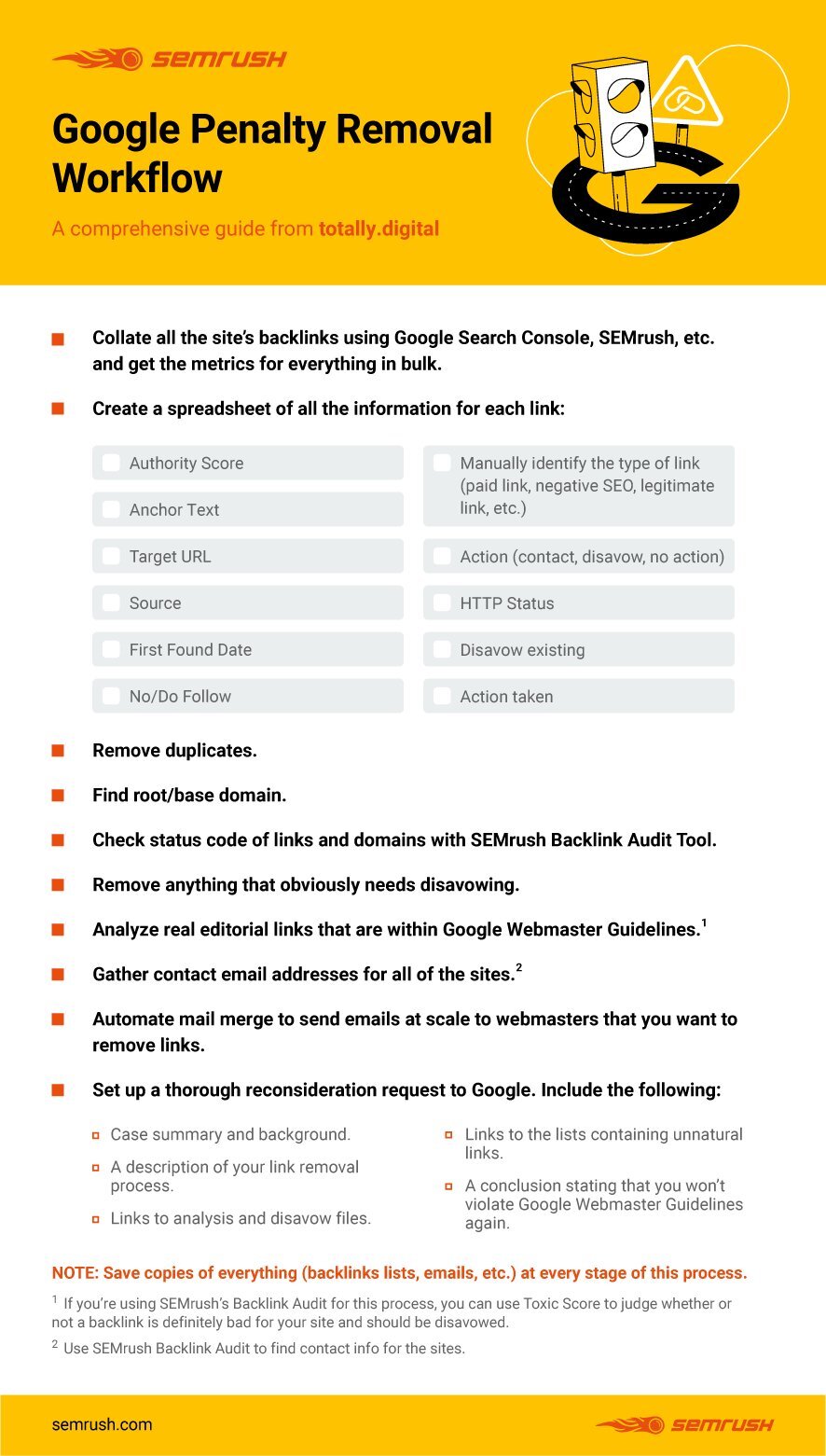
8. How Long Does It Take To Rank on Google?
Well, as is the answer for many SEOs: it depends.Long gone are the days of launching a website, optimizing your title tags, and ranking in a few weeks. You can't launch a website and expect it to rank for competitive search queries overnight. It takes time for a website to perform organically as Google ranks relevant sites that have built up authority.
You need to earn your way to the top of Google and deserve to be there.
A good answer is somewhere between six months and one year, but this is very much based on the level of resources you allocate to your strategy, the level of competition, and what others who compete for the same queries are doing.
It might only take a few months to rank for a local term (e.g., plumber in [location]), whereas it could take years to rank a new website for, let's say, the term "laptops."
And Google's John Mueller recently said that it could take up to a year for them to figure out where a new site should rank, and that fluctuations are expected during this timeframe.
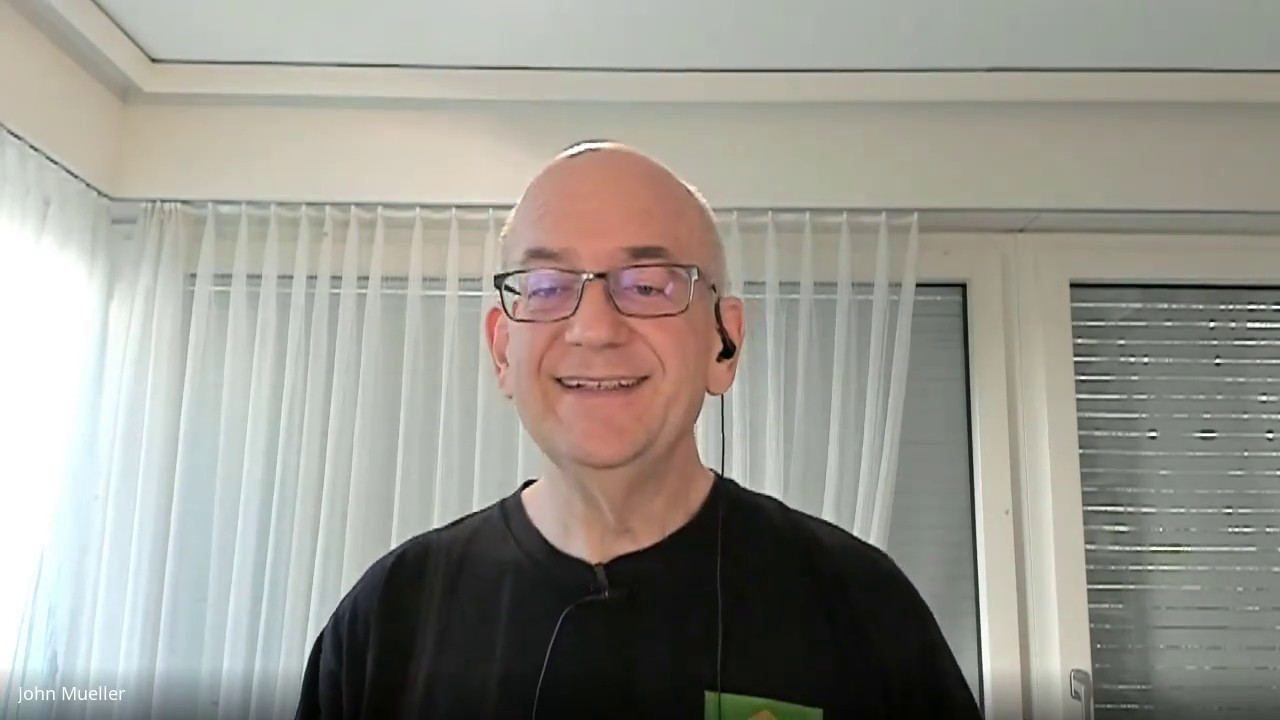
9. What Are Google's Most Important Ranking Factors?
Back in 2016, Google confirmed its top 3 ranking factors as links, content, and RankBrain.
And in reality, optimizing for these factors means creating great content that other websites want to link to and that Google can understand as the best result for any given search query.
But various ranking factor studies have delved deeper into Google’s algorithm to shine a light on those areas that have the most significant impact on organic performance.
For example, take the SEMrush Ranking Factors 2.0 study, which highlighted additional factors such as:
Time on site Total referring domains Content length Followed backlinks And more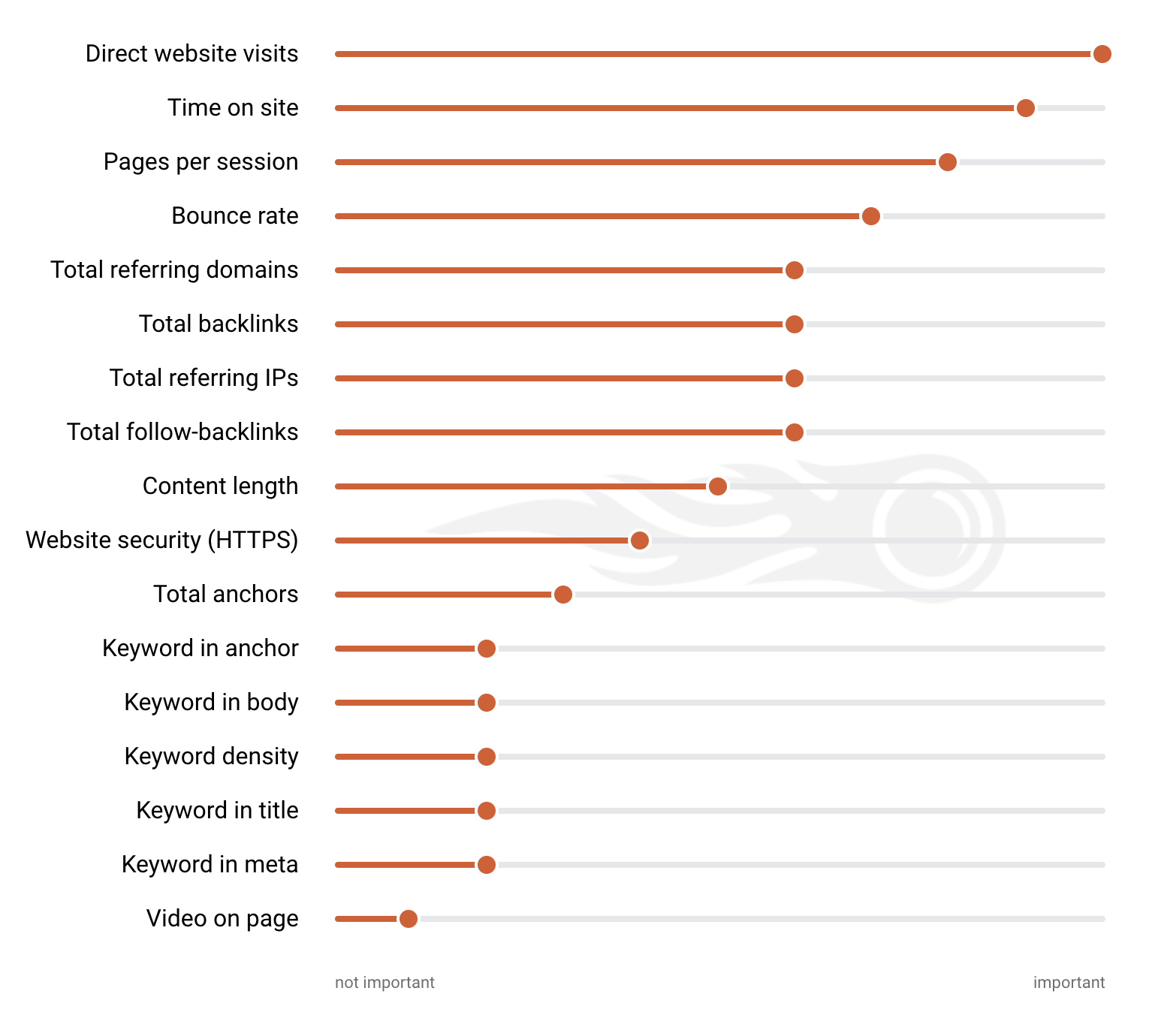
Zyppy's Google SEO Success Factors resource is another excellent read on this topic.
10. Should I Do SEO, Run PPC Ads, or Both?
A question that's always asked is whether a business should invest in SEO, PPC, or both. It's the age-old SEO vs. PPC debate.
In an ideal world, a business should balance multiple marketing channels to avoid a reliance on any single source of traffic (and conversions). But, especially for smaller businesses, budget is often a challenge, and resources must be allocated efficiently. Funds aren't endless.
Even in this instance, it's essential to balance a long-term SEO strategy with a small but targeted PPC campaign.
11. Does Social Media Help To Increase My Website's Rank?
There's a common misconception that posting on social media helps increase your website's rank on search engines. As Moss Clement states in our guide to 7 Ways Social Media Can Improve Your SEO Results:
Social media does not directly contribute to SEO ranking, but the links you share across social platforms increase brand exposure.Your shares across social media sites have no place in SEO rankings. Still, when more people share your content throughout social media, it generates social signals that indicate your posts are useful to your target market.
While social media doesn't directly increase your search engine rankings, it indirectly affects and helps build your brand.
Technical SEO Questions
Without solid technical foundations, Google will struggle to crawl, index, and rank your website. While technical SEO can get pretty complicated quite quickly, here are some of the most commonly asked questions around this topic.
12. What Is The Difference Between On-Page SEO and Technical SEO?
While often used interchangeably, on-page SEO and technical SEO are not the same.
We can see the table below to compare these two different areas:
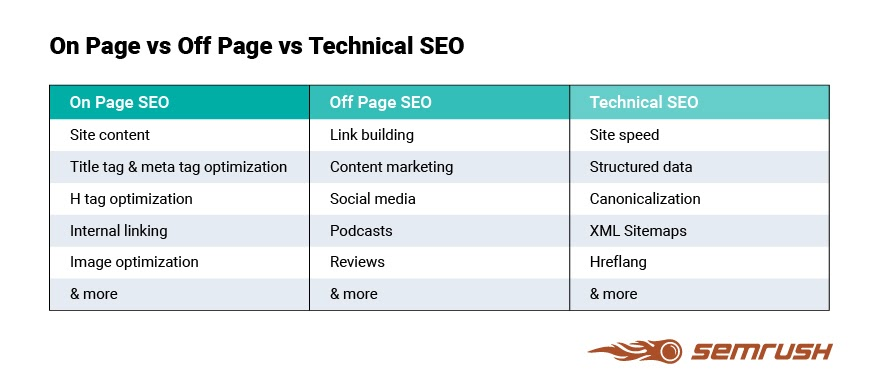
Ultimately, on-page SEO covers your page's content, meta tags, images, and the like. Think of these as the page elements that are visible to users.
Technical SEO, on the other hand, is all about how Google crawls and indexes your site. Think things like site speed, structured data, canonicalization, XML sitemaps, hreflang, and more.
13. What PageSpeed Score Should I Aim For?
PageSpeed is Google's measure of your site's speed, and it's important to note that this has now been a ranking factor for some time.But a question that commonly comes is, what should your page speed be? The honest answer is that you should aim for page speed to be as high as possible while ensuring you know what you're up against. It can be extremely resource-intensive to improve your PageSpeed score beyond a certain point, and sometime's you'll find that your site already performs better than your competitors.
If your PageSpeed score is 85/100, it may be difficult, costly, or time-consuming to get to even 90/100. If your competitors are all below 80/100, there are probably more pressing priorities to focus on.
Run your competitors through the PageSpeed Insights tool and make decisions in context.
14. How Can I Find Technical SEO Errors?
Technical SEO errors can hold back your site and prevent it from performing as well as it could in organic search. You need to be able to identify and fix issues promptly and keep on top of them.
To monitor technical issues, you can use the SEMrush Site Audit Tool to identify problems and opportunities. You'll find a range of thematic reports covering crawlability, HTTPS, site performance, and more, as well as errors, warnings, and notices across over 130 points.
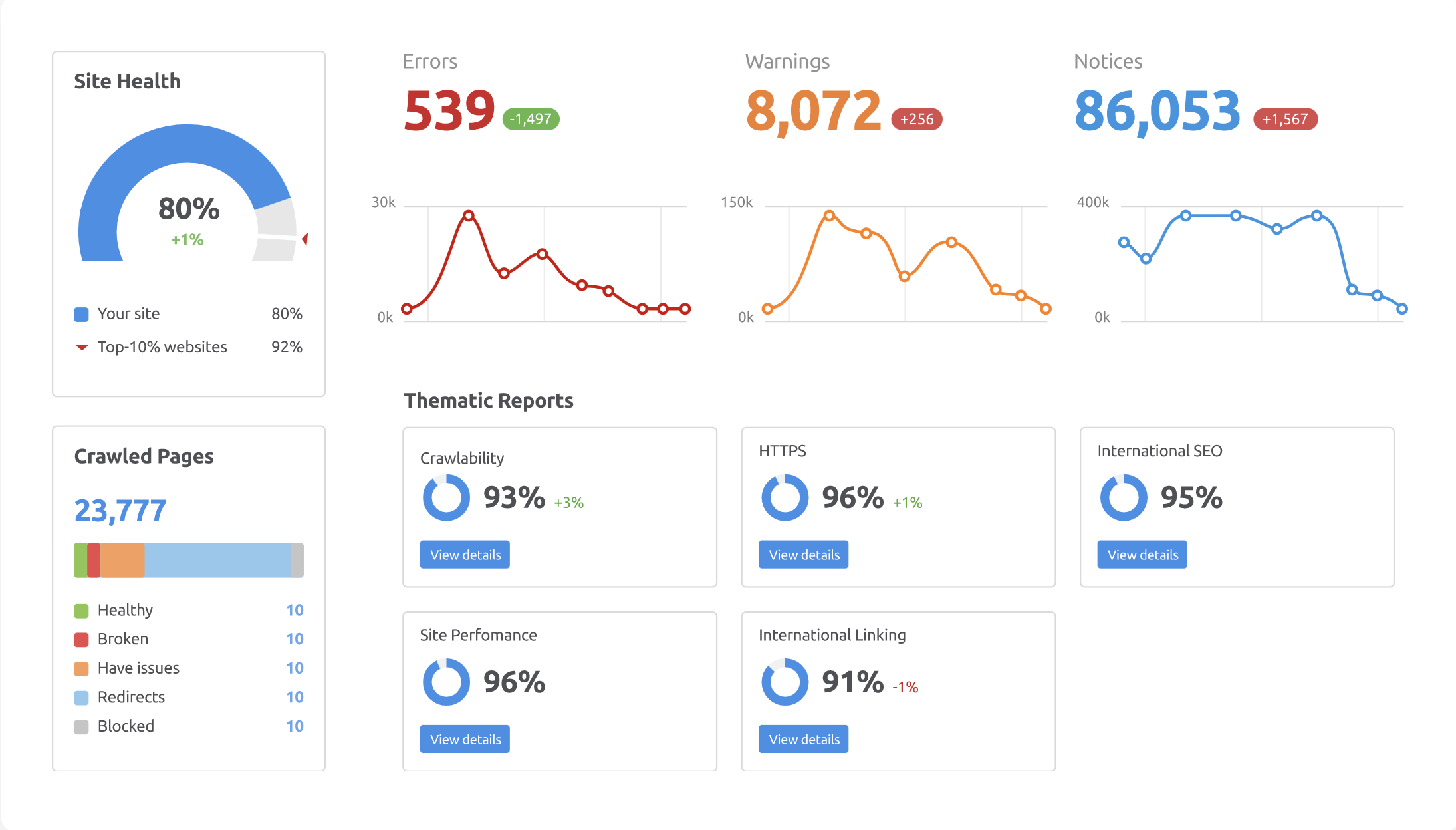
Work through these issues, starting with the highest priority errors, using the audit report's guidance to help you improve your site's overall health score.
Content Marketing Questions
Content remains crucial to earning top rankings. The days of creating 'SEO' content are long gone, and the ultimate route to success is to create the best content on the web across a particular topic.
Here are some of the questions that are most commonly asked around content:
15. How Long Should a Page of Content Be?
How long is a piece of string? Honestly, there's no right answer to this question, yet it's one that's asked time and time again. Content should be as long as it needs to cover a topic in enough depth to rank.
But that's not too helpful, is it?
When creating content, you need to look at what already ranks. Analyze at least the top 10 pages to understand the page's intent and the approximate length to get an indication as to how long your content needs to be—looking for a helpful way to do so? You can use the SEO Content Template to help you to figure out this length.
Enter your page's target keywords, and the tool will analyze the top-ranked pages and make a recommendation.

But don't obsess over content length! You should focus your efforts on creating content that answers queries in the best possible way.
16. How Do I Create SEO-Friendly Content?
SEO-friendly content doesn't mean keyword-stuffed content, far from it.
The reality is that SEO needs to be an essential part of the content creation process if you want your content to perform well organically. So then, how do you create SEO-friendly content?
You start with keyword research to help you understand the terms people are searching for, determine search intent, the right format, and get your on-page SEO right.
You can learn all about the process of doing this step-by-step in our How to Create SEO-Friendly Content guide.
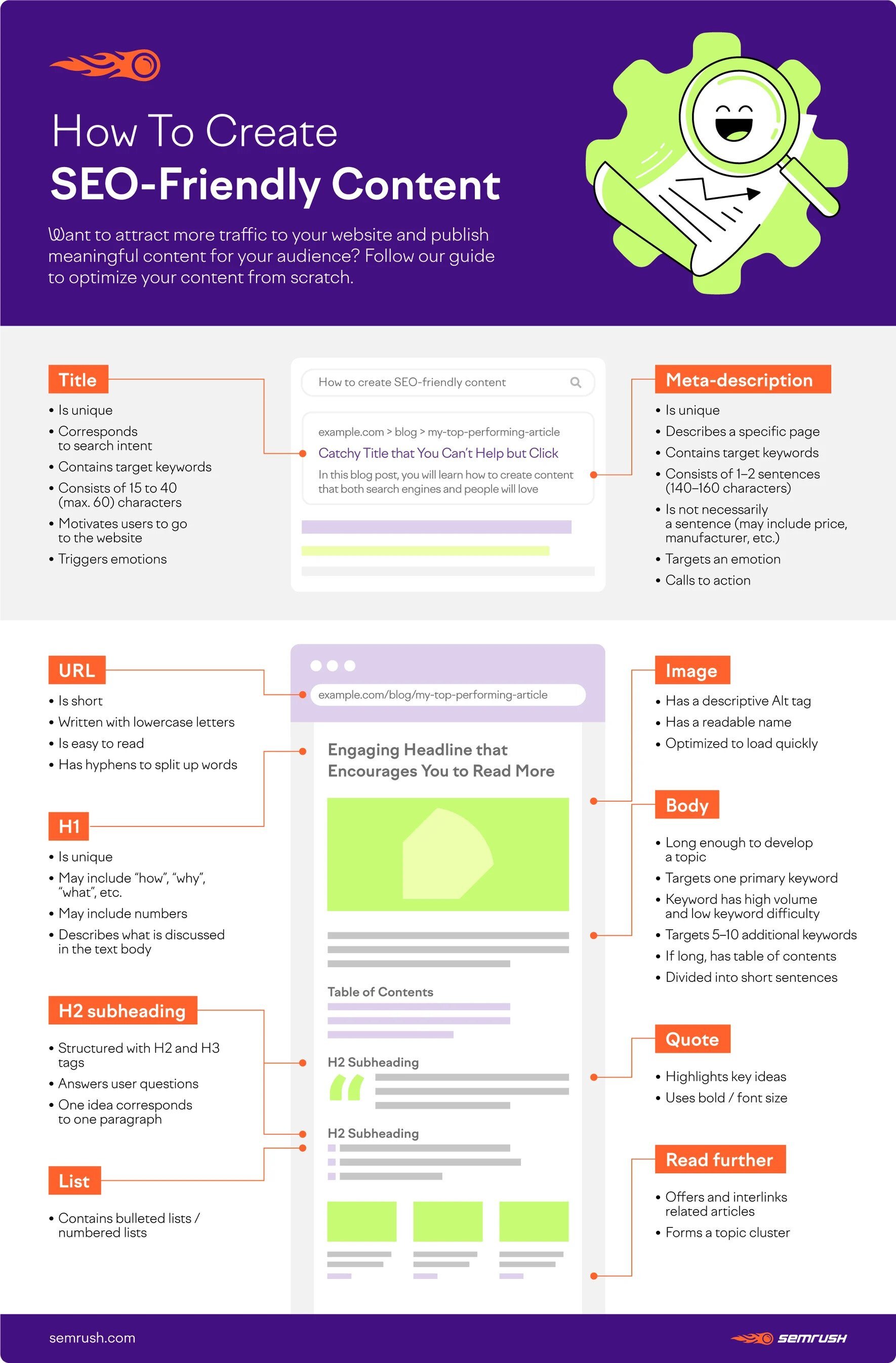
17. Does Duplicate Content Harm Your Website's Rankings?
You've probably heard horror stories about duplicate content. Many SEO beginners are often confused and concerned about what this means. In simple terms, duplicate content is where content is duplicated either between two or more websites or two or more internal pages.
Here, content can mean written content, title tags, meta descriptions, or H1 tags. We found this to be one of the biggest SEO mistakes that marketers make in our recent study.
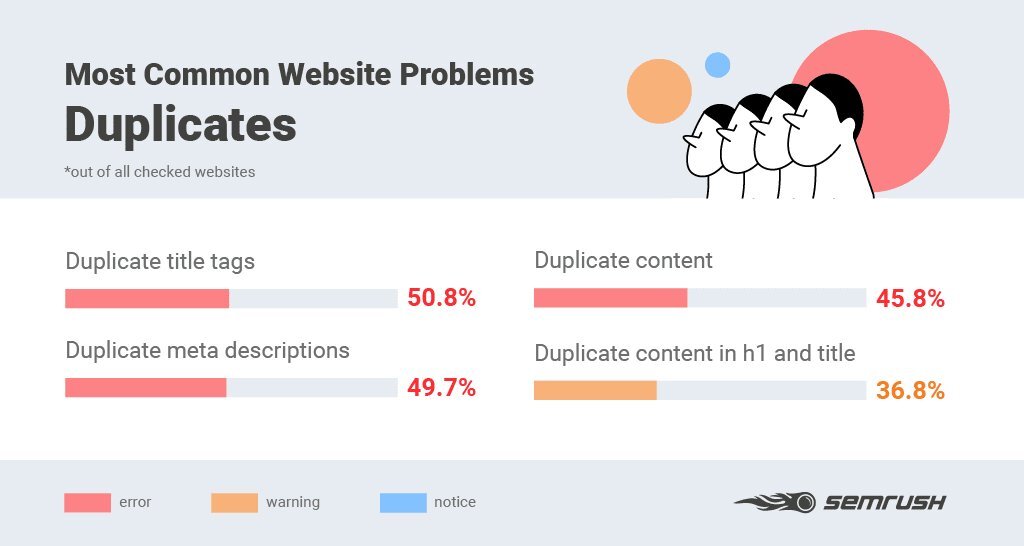
Our advice on this issue is as follows:
You should steer clear of duplicating any kind of content from any kind of site out there, whether they are a direct competitor or not. Look out for duplicate descriptions, paragraphs and entire sections of copy, duplicate H1 tags across multiple pages and URL issues, such as www and non-www versions of the same page. Pay attention to the uniqueness of every detail to make sure a page is not only rankable in Google’s eyes, but also clickable in users’ eyes.
As a general rule, don't copy large chunks of copy from other pages on your site or elsewhere on the web, and you can't go wrong.
Link Building Questions
Backlinks remain one of the most hotly debated topics in SEO. But links remain an essential part of an SEO strategy, and we've put together answers to some of the most common questions.
18. What Is Link Building?
Link building is the process of getting other websites to link to yours.
You see, links are one of Google's top 3 ranking factors, with these acting as a vote of trust from one website to another.
As we mentioned in our ' What are Backlinks?' guide, "If five people who didn’t know each other all recommended a particular restaurant as the best in your city, you would likely trust that you would be able to get a good meal there, as multiple individuals would all be vouching for it."
Think about links like this, and it's easy to understand why they're such an important ranking factor. But not all links are equal, and not all are of high quality. Some links are deemed manipulative and unnatural. Focus your efforts on earning links from websites that are topically related to yours and that are held in authority.
19. How Do I Get Other Sites To Link To Mine?
There are many different ways that you can get other sites to link to yours naturally.
And Tristam Jarman's SEMrush video is a great starting point to help you to understand your options:
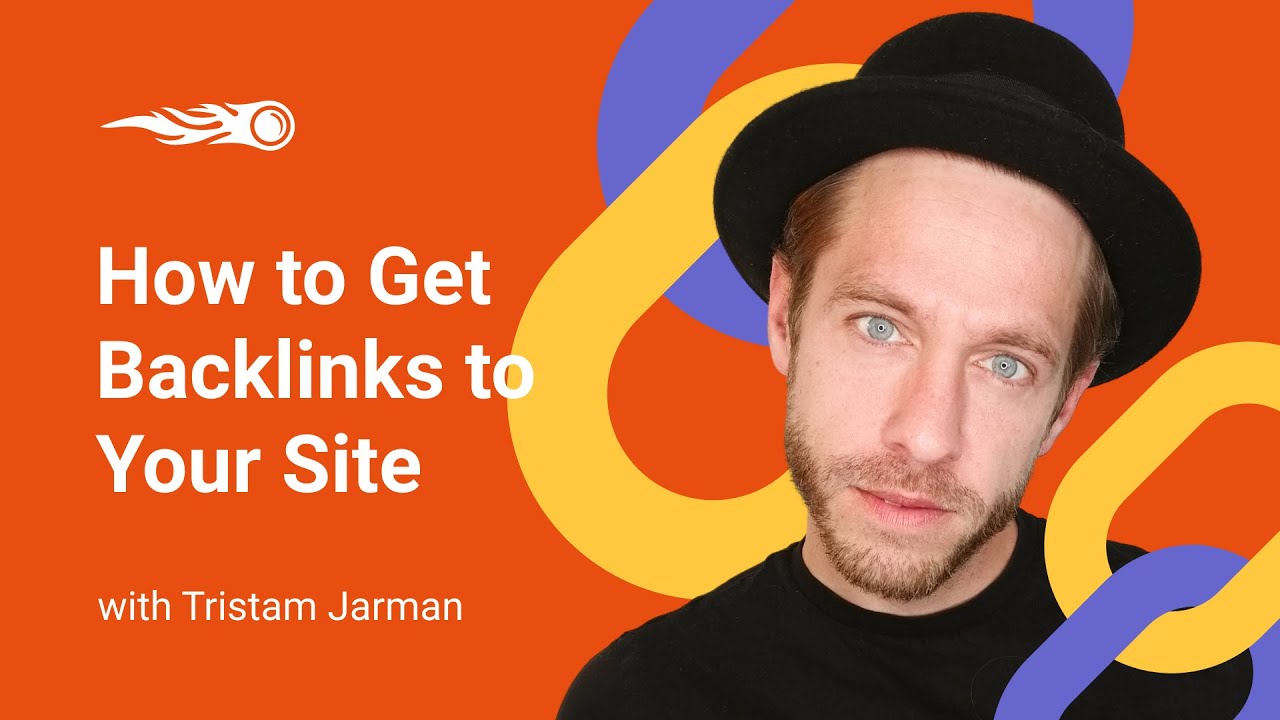
We then recommend taking a read of our Link Building for SEO: Which Strategies Work in 2020 (and Which Don’t) guide. If you're looking for some quick tips, here are some excellent tactics that you can use to earn quality links to your site:
Broken link building Unlinked brand mentions Supplier links Digital PR Resource link building Newsjacking The Skyscraper TechniqueFocus on quality, earned links, and a strategy that balances different approaches to help you build a varied link profile that targets links from multiple various sources.
20. Should I Focus On Getting More Links?
Link building is about quality rather than quantity. You should never set your sight solely on building as many links as possible. This will only leave you feeling disappointed with the results. When you focus on numbers alone, the quality of links will inevitably drop. And that's the wrong way to approach link building.
You need to emphasize earning quality links at scale, being sure to never sacrifice quality for quantity. Scalable tactics, such as digital PR, can help you earn links at scale from quality and authoritative sources. Still, it's essential also to understand the link gap between you and your competitors.
You can analyze this using the Backlink Gap Tool:

21. Is It True That I Can Buy Links?
NO, NO, NO!
Buying links is a substantial violation of Google's Webmaster Guidelines and could result in your website being penalized. The link scheme guidelines clearly state that the following links are examples of those that can negatively impact a site's ranking in search results:
Buying or selling links that pass PageRank. This includes exchanging money for links, or posts that contain links; exchanging goods or services for links; or sending someone a “free” product in exchange for them writing about it and including a link.
Links should never be bought, only earned.
22. What Is PageRank?
You've probably heard that links pass PageRank. But what exactly is this?
PageRank is "a system for ranking web pages that Google's founders Larry Page and Sergey Brin developed at Stanford University. And what it is important to understand is that PageRank is all about links."
We can think of the PageRank of a web page as a vote of authority, and this authority can then be passed to other pages or websites through links (both internal and external). In simple terms, it's a measure of the importance of a web page according to the quantity and quality of links that point to it.
While Google still uses PageRank as part of its algorithm, the reality is that your focus should primarily be upon earning topically relevant links from authoritative websites.
DYK that after 18 years we're still using PageRank (and 100s of other signals) in ranking?Wanna know how it works? https://t.co/CfOlxGauGF pic.twitter.com/3YJeNbXLml
— Gary 鯨理/경리 Illyes (@methode) February 9, 201723. How Do I Analyze My Competitor's Link Profile?
It's all well and useful building links to your site, but if you want to compete for competitive terms, you'll need to understand what you're up against. That means analyzing your competitor's link profiles.
You can do this using the Backlink Analytics tool.
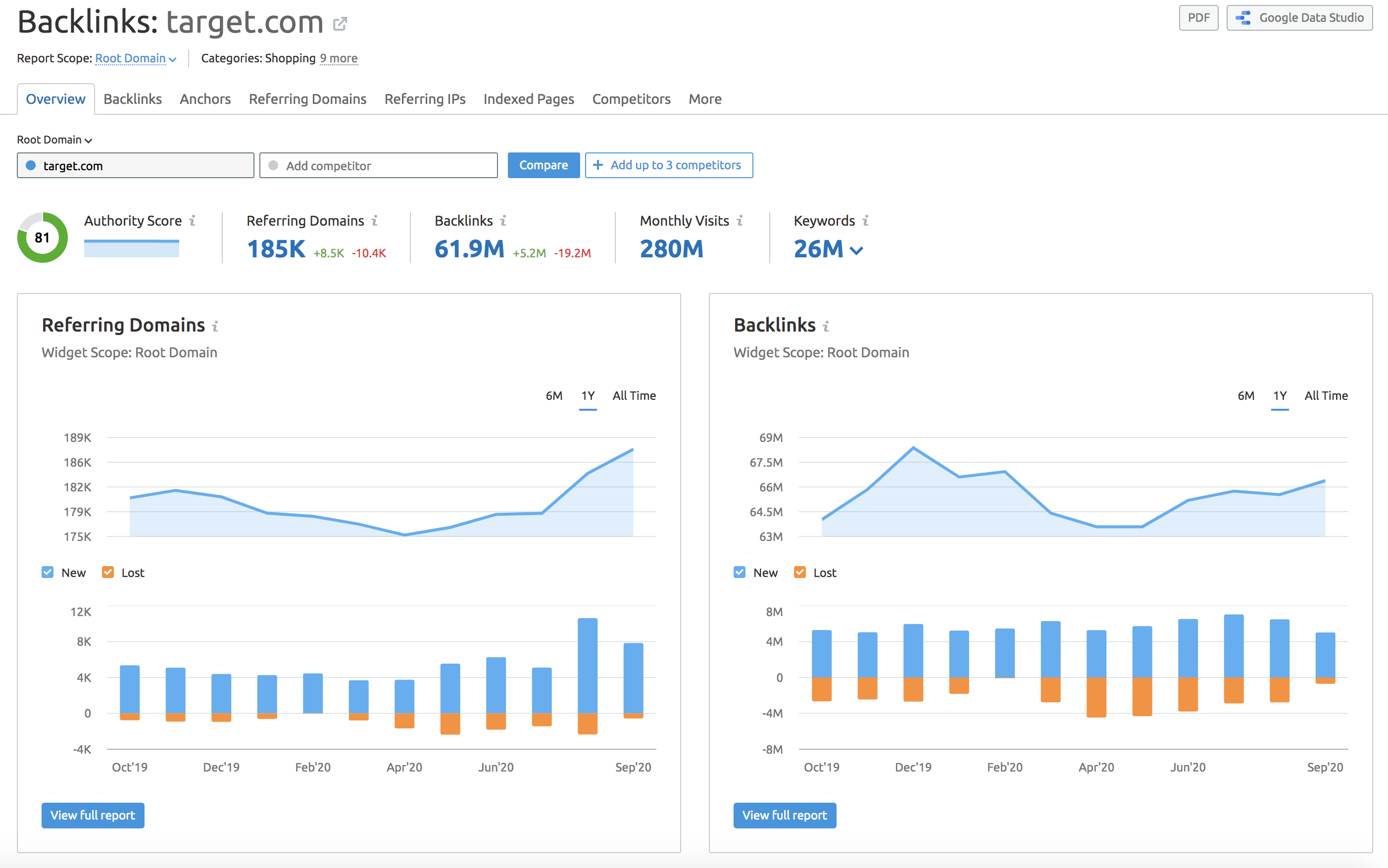
Run your competitor's domain through the tool, and you'll be able to see insights across:
The total number of backlinks The total number of referring domains The topical categories of referring domains Referring domains by authority score Top linked pagesYou'll also be able to see the pages linking to their site to start to plan whether or not some of these could also link to you.
While the above are just some of the SEO FAQs that we hear, they're some of the more important ones. That said, one of the best ways to develop your skills as an SEO is to ask questions.
Always keep learning, and don't be afraid to ask! There'll always be someone happy to help you out.Innovative SEO services
SEO is a patience game; no secret there. We`ll work with you to develop a Search strategy focused on producing increased traffic rankings in as early as 3-months.
A proven Allinclusive. SEO services for measuring, executing, and optimizing for Search Engine success. We say what we do and do what we say.
Our company as Semrush Agency Partner has designed a search engine optimization service that is both ethical and result-driven. We use the latest tools, strategies, and trends to help you move up in the search engines for the right keywords to get noticed by the right audience.
Today, you can schedule a Discovery call with us about your company needs.
Source:





